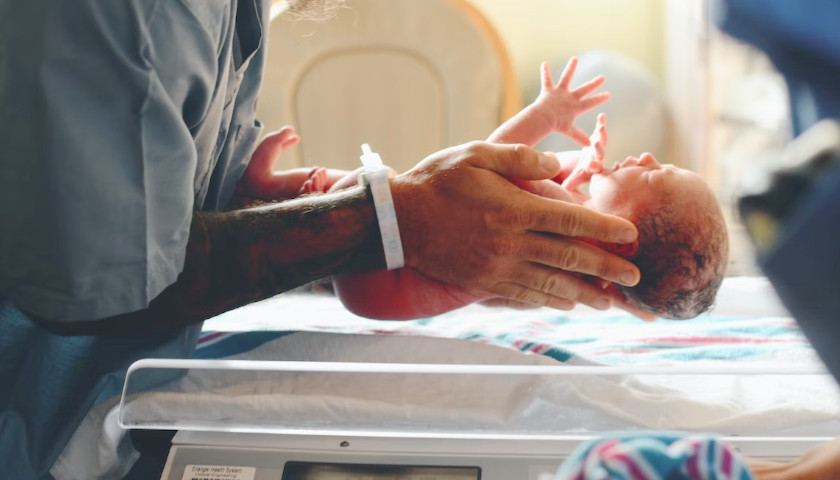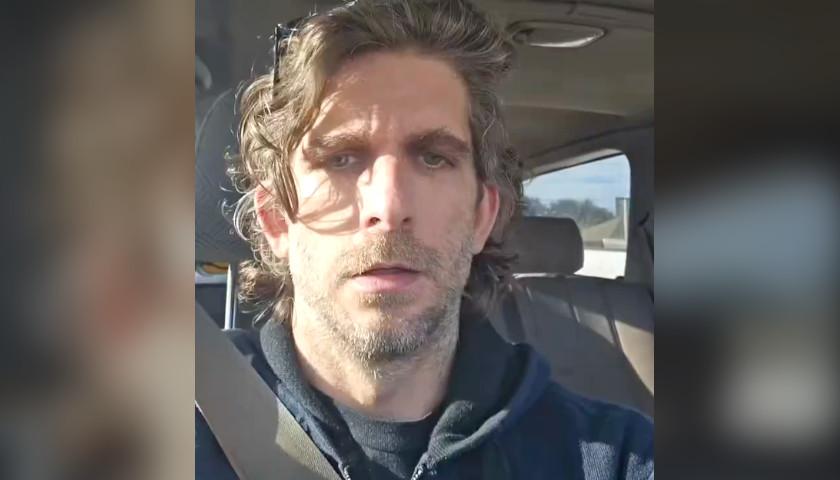A pro-life referendum takes center stage in Montana as state residents are set to decide whether to give additional legal protections to babies who survive abortions.
Montana LR-131, also known as the Born-Alive Infant Protection Act, says that infants born alive after an abortion are legal persons and that healthcare providers must take “necessary actions to preserve the life of a born-alive infant.” These “necessary actions” include “the right to appropriate and reasonable medical care and treatment.”
If a medical provider fails to give adequate medical care to a baby who survived an abortion, they could face up to 20 years in jail and a $50,000 fine.
The referendum defines “born-alive” as “the complete expulsion or extraction from the mother of a human infant, at any stage of development, who, after expulsion or extraction, breathes, has a beating heart, or has definite movement of voluntary muscles, regardless of whether the umbilical cord has been cut and regardless of whether the expulsion or extraction occurs as a result of natural or induced labor, cesarean section, induced abortion, or another method.”
Dr. Ingrid Skop, director of medical affairs for Charlotte Lozier Institute, told The Star News Network this referendum is saying that if an abortionist fails to terminate a woman’s pregnancy and a baby is born alive, the baby is in a different class. The baby is a live-born infant.
Skop added that Montana is trying to protect those babies and says that now that they are infants, they deserve care.
“If an abortionist does not kill the baby before the abortion, we know that many of those babies are born alive, even if they are very young,” Skop said.
The American College of Obstetricians and Gynecologists conducted a study where it found pregnancies terminated without feticide occurred 50.6 percent of the time. Feticide is a term used in the legal and medical professions meaning “the act of causing the death of a fetus.”
The study examined 241 pregnancies at the Medical University of Vienna.
The study also found the average survival time of these babies was 32 minutes. The range of babies’ survival times lasted from 1 minute to 267 minutes, or 4.5 hours. In the study, a women’s gestational length ranged from 20 to 24 weeks.
According to LifeNews.com, since 2021, in six states at least 215 babies were born alive after an attempted abortion. Those state were: Arizona, Florida, Indiana, Michigan, Minnesota, and Texas. The website notes that only 10 states require any reporting on these cases, and not all of the states make the data publicly available.
Despite the referendum’s language limiting the proposed law’s protections to babies who survive abortion, LR-131’s opponents are shifting the narrative of the referendum to state that doctors will be punished for not trying to save the life of an infant who has no chance of survival.
Compassion for Montana Families (CMF), an organization that opposes the referendum, states on its website:
LR-131 would require healthcare providers to take the newborn away from their families to perform futile and painful procedures. They would be forced to ignore the family’s religious beliefs or personal wishes for fear of being charged with extreme penalties.
Several Montana medical associations have also come out against the referendum.
The Montana Medical Association opposed the measure, stating that “LR-131 is government interference in the patient-physician relationship and poses extreme criminal penalties.”
In addition, the Montana Nurses Association, Montana Hospital Association, and Montana Chapter of the American Academy of Pediatrics also said they do not support LR-131.
Dr. Tim Mitchell, an OBGYN in Montana who is against the referendum, told NPR that this referendum has “too much gray area.”
“Who is going to be the ones deciding what reasonable care is?” he said. “Is it going to be the state attorney general who is going to potentially look into cases, because anybody can file a complaint against a physician or providers who are involved in care of some of these very tragic circumstances?”
Dr. Skop, who has helped deliver more than 5,000 babies as an OBGYN, said the reason the referendum does not specifically define “reasonable care” is that it is written by attorneys and not doctors. Medicine is constantly changing, Skop said, and there is plenty of support for doctors from their professional organizations that tell them when to intervene.
Dr. Robin Pierucci, a full-time clinical neonatologist who practices in a level 3 newborn intensive care unit told The Star News Network that idea that the referendum would require doctors to prolong suffering or take babies out of parents’ arms “is based on fear.”
“‘Caring for’ does not mean a lot of tubes and vents and medical devices. It means showing up and figuring out what’s the best thing to do so we don’t prolong suffering and promote healing,” the doctor said.
Pierucci, speaking in her individual capacity as a medical professional, testified in front of the Montana Legislature in favor of the referendum in 2021.
However, Pierucci’s views on LR-131 do not reflect those of her current employer.
The neonatologist said that, as a critical care doctor, she never wants to “just do something to do something.”
“When we intervene, the hope is that I am providing care, and not just doing something to the patient; we are doing something for the patient,” she said.
Pierucci said sometimes the best care she can offer is to place the baby in the parents’ arms.
“We have to stay very humble and admit there are times where I can’t do anything to change the outcome,” she said.
Pierucci said doctors always have an obligation to care about human beings. She said the notion that “we should care less well for someone who is not perfect” goes against the oath she took when she became a physician.
“Everyone complains that you’re getting in the way of the doctor-physician relationship. No, we’re asking for standard of care, top-quality, medical care,” she said.
Skop said this referendum would not affect the discussions doctors have with their patients.
“My opinion, based on knowledge of how the conversation goes when a baby is born in a very early gestational age, is that there is nothing in the law that is going to prevent that neonatologist from having a conversation with the family about the options, and these options are not only full-court press, but the options are lesser degrees of treatment,” she said.
Pierucci said her concern is why people want to deny a human being who’s born alive “appropriate, reasonable medical care.”
“Why we would carve out something special for a baby who was actually born alive and say it’s reasonable to abandon them because they happen to be born under circumstances where there’s other doctors who think it’s okay to do that. That’s an odd paradox of what’s legally permissible in our country right now.”
Currently, Montana has a law that prevents infanticide. Also, Congress passed the Born-Alive Infants Protection Act of 2002, which said that an infant who survives abortion is considered a legal person.
Family Research Council (FRC), a “pro-marriage and pro-life” nonprofit organization, says the 2002 law did “not include any legal enforcement.” Thus, “[i]n the ensuing years states have passed varying levels of born-alive protections to make up for the lack of federal enforceability.”
FRC rates Montana’s born-alive laws as having “weak protection.”
In 2019, Montana tried to pass the “Montana Born-Alive Infant Protection Act” but then-Democratic Governor Steve Bullock vetoed the bill.
State Representative Matt Reiger (R-Kalispell), who introduced the referendum, said in an op-ed that it would not require “a hospice infant be taken from its family.”
“Directly in the language of LR 131, it states health care providers must take ‘medically appropriate and reasonable actions to preserve the life and health of a born-alive infant,’” he said. “Hospice care is appropriate and it is disingenuous of the opposition to misconstrue and belittle the hospice line of health care.”
Reiger did not respond to The Star News Network’s interview requests.
Skop said we need to treat these babies with respect.
“I just think the endpoint of your [referendum] will be these abortionists will realize ‘I am not operating without supervision now. Somebody is watching over my shoulder to make sure I do the right thing; that I don’t do an abortion at a later gestational age than I should.’”
Skop added that because it is hard to justify a late-term elective abortion, people who advocate for these types of abortions are “forced to go to very unusual situations.”
A spokesperson for CMF told The Montana Free Press that the organization is being financed by Planned Parenthood of Montana, Blue Mountain Clinic, and Montana Women Vote.
Blue Mountain is a healthcare provider that provides abortions in Missoula, Montana.
CMF and Blue Mountain did not respond to The Star News Network’s interview requests.
According to Ballotpedia, committees against this referendum have “over $1 million in contributions.” As of October 30, opponents against the referendum have spent $715,003.29.
Ballotpedia could not identify a committee that supported LR-131.
The referendum’s results will be known on November 8.
– – –
Zachery Schmidt is the Digital Editor of The Star News Network. Email tips to Zachery at [email protected]. Follow Zachery on Twitter @zacheryschmidt2.




